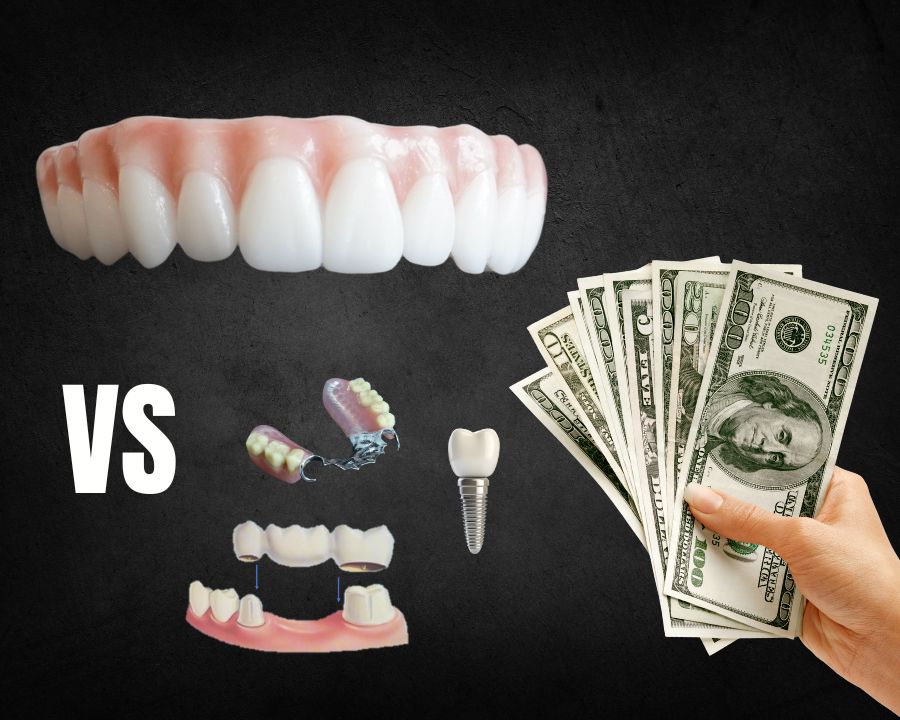You already know the “big questions.”
- How much does it cost?
- Will they hurt?
- How long will recovery take?
But here’s what almost nobody tells you: once you finally get your smile back, a whole new set of real-life questions pop up.
Questions that have nothing to do with surgery rooms or dental chairs — and everything to do with living your life again.
- Can you get through airport security without a hassle every time?
- Will coffee stain your brand-new teeth?
- Do you ever have lingering pains?
For someone who’s lived years hiding their mouth, avoiding steak dinners, dodging cameras, and praying dentures won’t slip at the worst possible moment… these aren’t “little curiosities.”
They’re the difference between feeling truly free with your new smile… or being shackled with a whole new set of worries.
And here’s the thing: when you choose the traditional route, you don’t even get to start asking these questions for nearly a year — stuck in plastic “temps,” waiting and hoping the adjustment to your final teeth goes smoothly.
At Nuvia, it’s different. Patients walk in for their procedure with failing teeth and return 24 hours later for their permanent, custom zirconia smile. No plastic temps. No waiting 10+ months. Just a real, lasting smile right away.
That’s why we pulled together this list of real-life FAQs about dental implants. Not the standard, brochure-style ones… but the surprising, human questions actual patients ask once they’ve lived with their new smiles for a few months.
And if you’re still stuck with teeth you can’t trust and haven’t made up your mind about dental implants — these answers will give you a clear picture of what life could look like on the other side of your decision.
.jpg)
1. Can You Get an MRI With Dental Implants?
If you’ve ever had an MRI, you’ve heard it: “Remove all metal.” So it’s natural to wonder if implants could be a problem.
The answer: no. Modern implants — like the titanium and zirconia used at Nuvia — are 100% MRI-safe. They’ll show up on the scan, but they won’t cause harm or interfere. Though it is important to always inform your doctor about your dental implants.
And because Nuvia uses top-quality materials placed by board-certified oral surgeons, you can step into that machine with confidence.
Here is what Oral & Maxillofacial surgeon Dr. Patel shared about dental implant materials. "Titanium is a biocompatible metal that's used throughout the medical industry. It's been used for well over the past forty years. We use we use titanium all over the face."
He continues to share how safe titanium is and how it has a proven track record for other procedures as well. "titanium is so widely used in the medical industry for hip replacements, shoulder replacements, reconstruction plates that you might see in trauma all over the body for for reconstructive purposes."
2. Can You Go Through Airport Security With Dental Implants?
Many patients don’t admit this fear until travel time: “What if my implants set off the alarm?”
Rest easy — they won’t. Titanium is too small and lightweight to trigger airport scanners. The same goes for concerts, sporting events, or courthouse metal detectors.
You won’t be pulled aside, and you won’t have to explain your smile to a security guard. Just another reminder that life with implants is simpler, not more complicated.
3. Do You Ever Have Occasional Smile Pains?
In the first few months, some patients may notice little twinges as the bone adapts around the dental implants — similar to muscles after a workout.
Once healing is complete, smiling shouldn’t hurt, and neither should your new teeth. If sharp or ongoing pain shows up later, that’s a reason to check in with your dental team.
4. Which Toothpaste Is OK for Dental Implants?
Good news: you don’t need anything fancy. Most everyday toothpastes work just fine with your new teeth and dental implants.
The only thing to avoid is abrasive whitening pastes that can scratch or dull your zirconia teeth. A gentle fluoride toothpaste is usually best — simple, effective, and easy to find.
And because zirconia doesn’t get cavities, your brushing is more about keeping gums healthy and breath fresh than fighting tooth decay.
5. Will Coffee or Tea Stain My New Teeth?
Natural teeth stain because enamel is porous. Zirconia isn’t. That means your new smile won’t pick up the brown or yellow tones you may remember.
Coffee or tea can leave a temporary film, but regular brushing — and an occasional polish at checkups — keeps your teeth bright.
So yes, you can keep your morning coffee ritual without ruining your investment.
6. Will Gaining or Losing Weight Affect My Dental Implants?
No. Your implants are anchored into your jawbone, not soft tissue. That means changes in body weight don’t loosen or shift them.
Dentures depend on gums and cheeks so major weight changes can impact their fit, but dental implants stay secure. Even with major weight changes, your smile will stay put.
The best way to protect them long-term is simple: good hygiene and regular check-ins with your dental team.
7. Do Dental Implants Make My Breath Smell Different?
Dental implants and zirconia teeth themselves don’t cause bad breath. What can? The same thing that affects natural teeth — food and bacteria collecting around the gums.
With daily brushing, flossing, and routine cleanings, most patients actually notice fresher breath after implants, since failing teeth or infections (often the real culprits) are gone.
8. Can I Chew Ice or Hard Candy With Implants?
Zirconia teeth are incredibly strong — much stronger than natural enamel. That means you can confidently enjoy everyday foods you may have avoided before, from apples to corn on the cob.
Hard candy or the occasional piece of ice won’t ruin your new teeth. But constantly crunching on them can put unnecessary stress on even the strongest teeth, natural or zirconia.
Your new smile is built tough — just give it the same common-sense care you’d give anything valuable you want to last.
9. If I Faint or Need Emergency Care, Will Paramedics Know I Have Implants?
Dental implants aren’t obvious to first responders the way a medical bracelet or pacemaker scar might be. If you faint or need emergency care, paramedics won’t automatically know.
The good news: dental implants don’t interfere with treatment. Still, if you have other health conditions, it’s smart to carry a medical ID or note it in your phone’s emergency info.
Your new teeth won’t hold you back from getting the care you need.
The Bigger Picture: Living Fully Again
All these questions point to one truth: dental implants aren’t just about fixing teeth. They’re about living without limits. Traveling without fear. Smiling without pain. Eating the foods you love without worry.
With Nuvia, you don’t have to wait months in plastic temps to experience that freedom. Patients walk out with their permanent smile just 24 hours after their procedure.
The only question left is: how much longer are you willing to put life on hold?
Your next step is simple: take the 60-second quiz to see if you may be a candidate for a life-changing new smile.
Don’t wait. Dental problems don’t get better on their own. The longer you live with failing teeth, the greater the risk for bone loss, infection, and other health complications. Every month you put this off is likely another month lost to pain, embarrassment, and worry.
Key Takeaways:
- Dental implants and zirconia teeth are MRI-safe and won’t trigger airport security scanners.
- Zirconia teeth don’t stain from coffee or tea and are designed to stay bright for years.
- Implants are anchored to bone, so weight changes or facial shifts won’t affect your smile’s fit.
- Good hygiene—not special products— keeps your dental implants healthy and your breath fresh.

.jpg)










.jpg)




